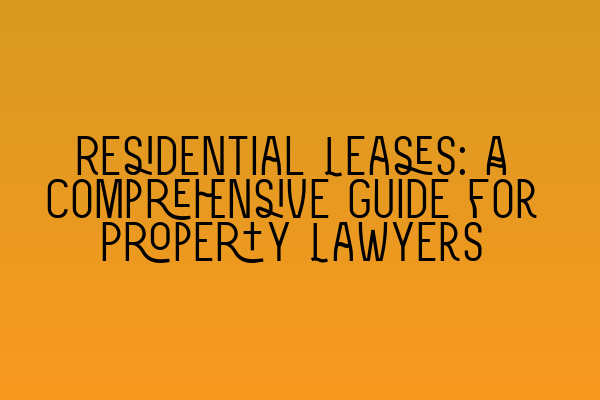Residential Leases: A Comprehensive Guide for Property Lawyers
Welcome to SQE Property Law & Land Law, where we specialize in providing expert legal advice and services in all aspects of property law. In this comprehensive guide, we will delve into the intricacies of residential leases and explore the essential information that property lawyers need to know. Whether you are a seasoned practitioner or just starting out in your legal career, this guide will serve as a valuable resource for understanding and navigating the complexities of residential lease transactions.
What is a Residential Lease?
A residential lease, also known as a rental agreement, is a legally binding contract between a landlord and a tenant, granting the tenant the right to occupy and use a residential property in exchange for payment of rent. This lease governs the rights and responsibilities of both parties and outlines the terms and conditions of the tenancy.
As a property lawyer, it is crucial to have a thorough understanding of the various elements that make up a residential lease. These elements include:
- Parties: Identifying the landlord(s) and tenant(s) involved in the lease agreement.
- Description of the Property: Providing a detailed description of the residential property being leased, including its address, boundaries, and any specific amenities.
- Term of the Lease: Specifying the duration of the tenancy, whether it is a fixed-term lease or a periodic tenancy.
- Rent: Establishing the amount of rent to be paid and the frequency of payments.
- Deposit: Outlining the requirements for a security deposit and any regulations governing its use and return.
- Repairs and Maintenance: Allocating the responsibilities for repairs and maintenance between the landlord and tenant.
- Termination: Defining the circumstances under which the lease can be terminated by either party.
By familiarizing yourself with each of these elements, you can effectively negotiate and draft residential leases that protect the interests of your clients while ensuring compliance with the relevant legal requirements.
Key Considerations in Residential Lease Transactions
Residential lease transactions involve several critical considerations that property lawyers must address to safeguard the interests of their clients. These considerations include:
- Tenant Screening: Conducting thorough tenant screening to evaluate the prospective tenant’s financial stability, creditworthiness, and rental history.
- Compliance with Landlord and Tenant Laws: Ensuring that the lease agreement complies with all applicable landlord and tenant laws, including local housing regulations, anti-discrimination laws, and rent control ordinances.
- Insurance Requirements: Advising clients on the necessity of obtaining adequate insurance coverage to protect their property and liability.
- Notice Requirements: Informing clients about the specific notice requirements for various lease-related matters, such as rent increases, property inspections, and lease renewals or terminations.
- Evictions: Providing guidance on the eviction process and assisting clients in taking appropriate legal action when tenants fail to comply with the lease terms.
Being well-versed in these key considerations will enable you to navigate residential lease transactions with confidence and ensure that your clients’ interests are adequately protected.
Role of Property Lawyers in Residential Lease Disputes
Despite the best efforts to create a comprehensive and well-drafted residential lease, disputes can still arise between landlords and tenants. As a property lawyer, you play a vital role in resolving these disputes and ensuring a fair and equitable outcome. Some common residential lease disputes that you may encounter include:
- Non-Payment of Rent: Assisting landlords in pursuing legal remedies when tenants fail to pay rent in a timely manner.
- Property Damage: Advising landlords and tenants on their rights and obligations in cases of property damage and determining the responsibility for repairs.
- Violation of Lease Terms: Providing guidance on the appropriate action to take when a tenant violates the terms of the lease, such as unauthorized subletting or engaging in illegal activities on the premises.
- Illegal Evictions: Assisting tenants in challenging unlawful eviction attempts by landlords and ensuring that their rights are protected.
By being well-informed about the relevant laws and having strong negotiation and advocacy skills, you can effectively represent your clients’ interests and facilitate the resolution of residential lease disputes.
Conclusion
Residential leases are a fundamental aspect of property law, and property lawyers play a crucial role in ensuring that these lease transactions are fair, legal, and in the best interests of their clients. By understanding the key elements of a residential lease, addressing relevant considerations, and effectively handling lease disputes, property lawyers can provide valuable legal assistance and guidance to their clients.
If you are preparing for the SQE 1 or SQE 2 exams, be sure to check out our related articles:
- SQE 1 Practice Exam Questions
- SQE 1 Practice Mocks FLK1 FLK2
- SQE 2 Preparation Courses
- SQE 1 Preparation Courses
- SRA SQE Exam Dates
At SQE Property Law & Land Law, we are committed to helping aspiring solicitors succeed in their legal careers. Contact us today for expert advice and guidance on property law and land law matters.
